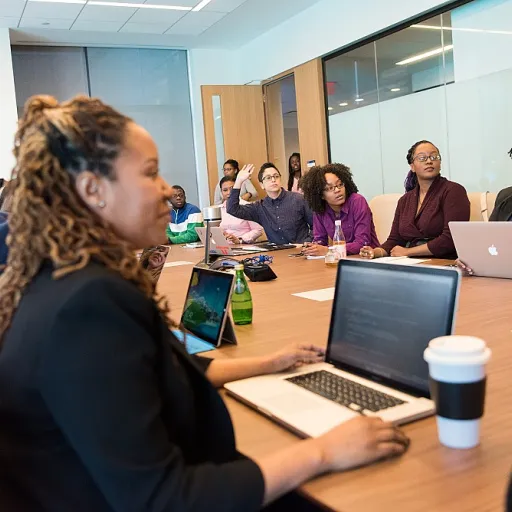
Understanding Next Generation Staffing
Embracing the Future of Staffing
As the workforce continues to evolve, understanding next generation staffing approaches becomes essential for businesses aiming to stay ahead in the increasingly competitive recruitment landscape. Traditional staffing methods are being redefined by the dynamic nature of jobs and the demands of modern workers. To effectively navigate this change, organizations must innovate not only in their recruitment techniques but also in their management and support systems.
Next generation recruitment is characterized by the integration of advanced staffing solutions, aiming to meet the needs of both talent and clients delivering outstanding results. In regions like Atlanta and Georgia, companies are joining efforts to transform recruitment staffing by focusing on open and inclusive recruitment policies that attract diverse talent from various backgrounds. This adaptability is crucial in sectors such as hospitality, accounting finance, and customer service where delivering high quality service is essential.
Staffing agencies play a pivotal role in this transformation, acting as bridges between the evolving expectations of job seekers and the strategic needs of employers. These agencies are not only tasked with recruitment but are also pivotal in delivering high quality support through comprehensive human resources management and development strategies. Erick Burroughs, for instance, exemplifies the importance of privacy policy and compliance in talent management, ensuring that the recruitment process remains fair and secure for all parties involved.
With the emergence of next generation staffing, businesses must also focus on developing leaders who are equipped to navigate and implement flexible work models. The focus extends beyond recruitment to include training programs that equip employees with skills necessary for future challenges, addressing imminent changes in work dynamics and the wider recruitment ecosystem. As next generation staffing solutions evolve, organizations that integrate innovative approaches will be better positioned to adapt, grow, and lead their respective industries.
The Role of Technology in Staffing
Leveraging Technology to Transform Recruitment
Understanding and embracing the role of technology in staffing is crucial for businesses aiming to succeed in the ever-evolving job market. The digital transformation affects how agencies and companies operate, enabling them to streamline recruitment processes and expand their reach to a broader audience. By utilizing advanced technologies, organizations can enhance their recruitment strategies and support human resources more efficiently. The rise of AI-driven tools and intelligent algorithms has opened new frontiers for staffing next generation teams. These technologies make it possible to analyze and match talent with open positions effectively, boasting better accuracy in recruitment staffing. By leveraging AI, staffing agencies can sift through volumes of applications and identify top candidates, saving time for human recruiters to focus on delivering high-quality customer experiences. In Georgia and beyond, adopting these technological solutions is key to remaining competitive in the recruitment landscape. Tools such as Applicant Tracking Systems (ATS) come with comprehensive capabilities to streamline recruitment, managing tasks like sorting applications, scheduling interviews, and even predicting potential job performance. This technology allows recruitment agencies to focus on business strategies and customer service, ensuring clients are met with exceptional support and high-quality staffing solutions. Moreover, emerging digital tools do not only support recruitment but also foster diversity and inclusive hiring processes. Algorithms can help eliminate bias, presenting candidates based on skills and qualifications rather than demographic factors, promoting a more diverse and inclusive workforce. As recruitment and staffing agencies embrace these technologies, they must also update their human resources policies to reflect data privacy standards, ensuring transparent and ethical technology use. In cities like Atlanta, where the job market is competitive, businesses and recruitment agencies can join the revolution of tech-enhanced staffing solutions. From accounting and finance to hospitality and customer service sectors, every industry can benefit from technology's transformative power. The leaders willing to integrate these resources will better position themselves to attract and retain generation talent who are technologically savvy. Harnessing technology in recruitment is not just a trend; it is a necessity. Moving forward, businesses that adapt to these technological advancements will likely find themselves thriving in the next era of workforce management, transforming challenges into vast opportunities for growth and success.Flexible Work Models
The Shift Toward More Flexible Work Models
Adapting to the evolving workforce landscape is crucial for organizations aiming to attract and retain the best talent. With the next generation of workers prioritizing flexibility, staffing agencies and businesses must reconsider traditional approaches. The open jobs market demands agility, and embracing flexible work models is a clear step forward to revolutionize recruitment staffing and generation recruitment. Let's dive into how organizations can implement innovative staffing solutions that meet the needs of modern employees:- Embrace Remote Work: With technological advancements, employees desire the ability to work from anywhere. Employers must integrate appropriate technologies and communication tools that support virtual collaboration and maintain high quality productivity. Staffing solutions that offer flexible roles will find success in attracting talent clients focused on work-life balance.
- Flexible Schedules: Beyond remote work, many next generation workers look for flexibility in their schedules. Offering alternative work hours and part-time opportunities can attract those who have commitments outside their professional lives. Organizations in sectors like hospitality and customer service can particularly benefit by accommodating diverse preferences.
- Project-Based Staffing: Businesses can effectively manage workforce needs by recruiting for specific projects rather than permanent positions. This approach not only offers solutions for fluctuating project demands but also attracts professionals who prefer short-term engagements. Agencies can support this by refining their recruitment strategies to match the right talent with suitable project-based assignments.
- Customized Staffing Solutions: With the demand for unique skills varying across industries such as accounting, finance, and human resources, custom-staffing approaches are essential. Tailoring recruitment efforts to address specific client needs ensures that companies secure the right expertise efficiently.
Diversity and Inclusion in Staffing
Diversity and Inclusion as Core Staffing Principles
In a world rapidly evolving towards more inclusive and diverse work environments, next-generation staffing models are embracing diversity and inclusion as pivotal staffing principles. Companies are increasingly recognizing that a diverse workforce is not just a social expectation but a valuable asset for recruiting and innovation. As businesses strive to open new opportunities and create inclusive policies, staffing leaders play a crucial role in promoting diversity within recruitment processes. In the context of recruiting the next wave of talent, including underrepresented groups becomes essential. Diversity within the recruitment team itself is becoming a priority to ensure that all candidates, regardless of their background, skills, or identity, have equal access to job opportunities. Recruitment agencies across different sectors, such as hospitality and accounting, need to work closely with clients to deliver high-quality diversity strategies. Diversity enriches teams by bringing in varied perspectives, which is vital for problem-solving and fostering innovation. Businesses and staffing agencies that prioritize equal opportunity in recruitment are more likely to build stronger teams that can adapt and thrive in a competitive market. As such, thoughtful recruitment and staffing policies that focus on inclusivity contribute to attracting next-generation talent. As part of staffing solutions, companies and staffing agencies alike are integrating inclusive strategies into their human resources workflows. This not only involves examining current recruitment practices but also ensuring that recruiting tools and platforms are accessible and free from bias. With a supportive recruitment policy, businesses are better prepared to join efforts in building teams that mirror the global and diverse customer base they serve, enhancing overall customer service and experience. Staffing for an inclusive future is not without its challenges, but it presents significant opportunities for forward-thinking leaders. As resources continue to evolve, those who prioritize diversity and inclusion will deliver exceptional service to their clients. Erick Burroughs, a thought leader in staffing next, emphasizes the importance of human-centered recruitment staffing and open opportunities for entities like businesses in Atlanta’s Suite of services. Ultimately, embracing diversity and inclusion in staffing creates a respectful and equitable workplace environment, allowing businesses to leverage the unique talents of their workforce and achieve sustainable success in delivering high-standard results for clients.Skills and Training for the Future Workforce
Preparing the Workforce with Future-Ready Skills
In an era where staffing and job landscapes are continually evolving, equipping the future workforce with the necessary skills has become crucial. The landscape of employment is shifting not just with technology and flexible work models, but also with the way human resources and recruitment staffing agencies like those in Georgia approach the talent pool. As businesses adapt, so must the skills of those entering the workforce or seeking new opportunities. One major trend is the increasing demand for digital literacy and technological proficiency. As firms rely heavily on tech solutions to streamline processes, candidates with strong technical skills are becoming more valuable. This applies across sectors, from accounting and finance to customer service, where exceptional service can be enhanced by high-quality tech support. Moreover, new job roles are emerging as businesses join the digital transformation bandwagon. Recruitment now targets individuals adept in next-generation tech tools, ensuring they possess the agility to navigate open-ended and dynamic work environments. Diversity training has also gained prominence within recruitment strategies. To tap into a wider talent pool, organizations are increasingly focusing on inclusive hiring policies, which look beyond traditional criteria to value diverse experiences and perspectives. This transformational approach not only supports business objectives but also fosters a more inclusive work culture. Professional development and continuous learning are pivotal. Staffing agencies and human resources departments are investing in training programs that build and refine skills relevant to new market demands. From Georgia to major business hubs, the emphasis is on lifelong learning. As leaders in recruitment join forces with educational institutions and businesses, tailored training modules ensure that talent remains competitive. Furthermore, businesses must examine their suite of talent solutions to ensure they are truly delivering high quality and value. Recruitment staffing is focused not just on filling roles. It's about delivering a high-quality experience that supports both the candidate's career growth and the employer's goals. As we adjust to next-generation recruitment, it’s crucial to deliver quality customer experiences. By focusing on proactive skills development and inclusive policies, management can prepare the upcoming workforce for the inevitable challenges and opportunities that the future holds. In conclusion, the successful integration of skills and training into staffing policies will determine how well businesses can adapt and thrive in a rapidly changing environment. High-quality talent and robust management strategies will be key drivers to staying competitive in the next generation of work.Challenges and Opportunities Ahead
Navigating the Future Landscape: Challenges and Opportunities
As we look towards the horizon, the staffing landscape is undergoing transformative changes, presenting both hurdles and potential for growth. One of the primary challenges lies in managing the diverse needs of the next generation workforce, which requires a balance between flexibility and stability.
Advances in technology, such as AI-powered recruitment solutions, are revolutionizing how staffing agencies and businesses operate. While this brings efficient recruiting methods, it also necessitates adaptation to privacy policies and data management practices, ensuring that sensitive information is handled with the utmost care.
Embracing diversity and inclusion in recruiting processes is another essential aspect, offering a broader spectrum of talent. Companies will need to craft policies that foster an inclusive environment, improving their recruitment and retention strategies. This involves not only hiring practices but also providing skills training and leadership opportunities for underrepresented groups.
The evolution toward flexible work models, highlighted by remote and hybrid options, requires organizations to rethink how they manage human resources. Leaders must be proactive in offering support, ensuring employees have the necessary tools and environments to thrive, leading to high quality service and productivity.
Moreover, addressing the skills gap is crucial. As industries shift their focus toward more technical and specialized roles, businesses must invest in training programs to upskill their employees, preparing them for the demands of their jobs. Clear communication and collaboration between educational institutions and industry leaders are pivotal to align the educational curriculum with future job requirements.
Although the path forward includes challenges, it also offers opportunities for innovation and growth. Staffing next generation talent in sectors like hospitality, accounting finance, and business services can bring exceptional value if approached with strategic vision.
As we enter this new era, the focus must remain on adapting and evolving, ensuring that both staffing agencies and businesses are equipped to meet future demands and continue delivering a high standard of customer service and client satisfaction.













